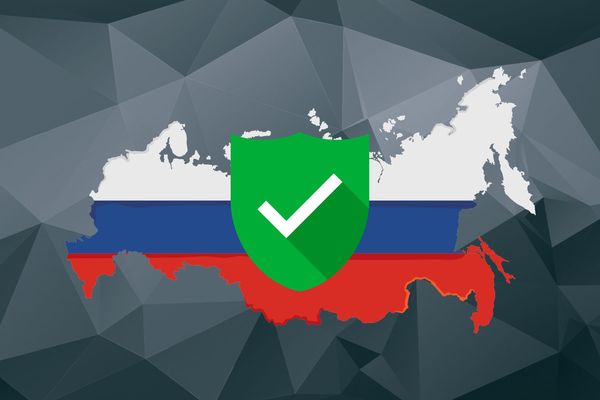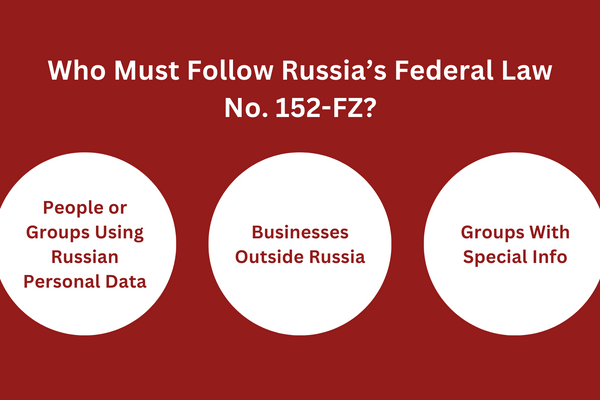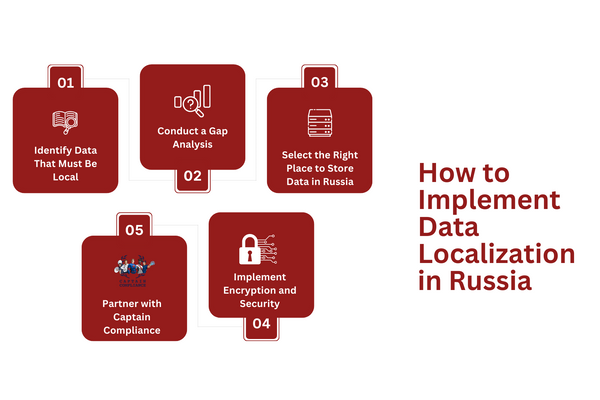
There are still sanctions on Russia as of todays data and there are restrictions on how you can and should handle any sort of data entering or coming out of the country at this time. We have advised and consulted with numerous companies working on these matters and can provide our data privacy software to businesses that are looking for privacy software solutions.
Russian data localization laws are a really big deal for businesses. This guide will help you understand what it’s all about. We’ll talk about where it came from, why it matters, and what businesses need to do. If you work with data from Russian people, this law affects you.
This law might sound tricky, but we’re here to make it simple for you. Stick with us, and by the end, you’ll know what you need to do to stay on the right side of the rules.
Let’s get started!
Key Takeaways
Russia’s got some really strict laws about keeping people’s personal data inside the country’s borders. It doesn’t matter where your business is located—if you’ve got data on Russian consumers, you need to store that in Russia.
The fines they’ll slap on you for slipping up are no joke. The first time you mess up, it’ll run you 1 to 6 million rubles. But make the same mistake again, and boom, the fine jumps up to 18 million.
Feeling kind of lost navigating Russia’s tricky data rules and corporate compliance? No worries, that’s why Captain Compliance is here! We’ve got the inside scoop on Russia’s laws and can help guide your business so you stay on the up and up.
Russia Federal Data Protection Law Explained

Federal Law No. 242-FZ is a major regulation in Russia that aims to protect Russian citizen data by keeping it inside Russia’s borders.
This law builds off Federal Law No. 252-FZ, which states that personal information can only be collected for specific purposes stated in advance. Once those goals have been achieved, further usage must cease unless explicitly mandated otherwise.
Any entity willing to collect and use an individual’s private details must acquire express consent beforehand.
Additionally, only necessary relevant details that meet explicit objectives may get gathered/processed
It also says if any business, Russian or not, is collecting personal data on Russian citizens, they need to store that stuff in databases inside Russia itself.
This applies to everyone, Russian or not, as long as they’re gathering data from Russian people. There are a couple of small exceptions, though, and if a business is doing something because of an international agreement with Russia, such as selling plane tickets, they might not have to follow the rule.
Some parts of the law, especially within the compliance framework, can be confusing. However, the authorities in Russia have said that businesses can have a copy of the database outside of Russia as long as the main one is inside the country.
They also need to be sure to follow other regulations, like getting citizens’ permission to move their information around.
Who Must Follow Russia’s Federal Law No. 152-FZ?

Alright, let’s break down who needs to listen to this big rule in Russia about personal information:
People or Groups Using Russian Personal Data: If you or your group uses personal info about Russians, you need to follow this law. This means if you collect or keep this kind of info.
Businesses Outside Russia: Even if your business isn’t in Russia, but you have info about people from Russia, you need to follow this law. This means you have to keep their info in Russia.
Groups With Special Info: Some data is really private and can be considered sensitive data, like where someone comes from, what they believe, or how they feel. If you have this kind of info, you must be extra careful.
So, if you have personal info about people from Russia, no matter where you are, you need to know this law. It’s all about keeping their data safe.
Does Russia Have a Data Localization Requirement?
Yes, Russia has set rules about where you can keep personal data. If your business collects information about people from Russia, you must keep that data in Russia itself. This isn’t just a suggestion – it’s mandatory.
Russia wants to make sure its citizens’ information stays protected. By keeping the data inside Russia, the government can watch over it closely. It’s all about ensuring businesses don’t misuse or mishandle customers’ personal details.
Now, some businesses might be wondering: Can we have a copy stored outside of Russia, too? The answer is yes, you can, but the primary, original copy must be in Russia.
When businesses get personal data from Russian citizens, they should put it in Russia. After that, if they want, they can transfer it elsewhere after passing through Roskomnadzor (a Russian federal agency).
So here’s the deal for businesses: If you’ve collected data on Russian individuals, start by storing it in Russia. It’s all about following the regulations and making sure everyone’s information stays secure.
Russia Data Localization Law Explained
When it comes to personal data, Russia has some clear rules. Let’s break it down!
Russia recently passed a new law about protecting people’s personal information, emphasizing the importance of data residency.
Basically, if any business collects details on Russian citizens – things like their name, address, phone number, etc. – that data has to be stored on servers located inside Russia.
The law applies not just to businesses operating in Russia but to any business worldwide that has data on Russian people. Whether you’re a tech firm, bank, airline, or anything else – if you’ve got info on Russian consumers, you need to follow these rules.
In a nutshell, data localization means keeping data in one particular country. For Russian law, it means all personal data on Russian citizens has to stay within Russia’s borders.
So even if you’re a business in the U. S. or EU, for example, you still need to make sure any Russian customer data you have is stored on Russian soil now. It doesn’t matter where the information is first recorded or processed – the storage location is what matters.
Exceptions to Russia Data Localization Law
There are some cases when businesses don’t have to follow this rule:
International Treaties: If there’s a need to process personal data because of an international treaty Russia has signed, then there’s an exception. For instance, when booking airline tickets, some airlines don’t have to localize the data.
For example, an exception applies if processing personal data is necessary in order to execute an international treaty of the Russian Federation in accordance with Russian legislation.
Duplication/Mirror Databases: While the main database should be in Russia, there can be a duplicate or mirror database outside Russia. But, there are conditions. For instance, all people whose data is being moved should agree to it. Additionally, you will most likely need to notify Roskomnadzor.
While the language of the requirements is still unclear, the regulator has published a non-binding opinion that duplication/mirror databases can be located outside Russia, provided the original (or master) databases are located in the Russian Federation.
How to Implement Data Localization in Russia

Navigating the world of data localization can be tricky, especially when it comes to Russia’s specific rules. But don’t fret! We’re here to guide businesses through the process and, if needed, help outsource compliance.
Let’s dive into the steps to make sure you’re on the right track:
Identify Relevant Data That Must Be Local
When it comes to Russian citizens’ personal data, first, you have to figure out what info you actually have – we’re talking names, addresses, phone numbers, and anything that can ID someone specifically.
And don’t forget, if you’ve got this data, it needs to be stored in Russia first and foremost. It isn’t just about hitting compliance targets; it’s about gaining people’s trust and making sure their data is handled properly.
Conduct a Gap Analysis
So you have to look at where you’re keeping all your data right now. Now, stack it up next to what the law says about data storage in Russia.
That’ll show you if there’s some kind of gap going on or areas you might want to tweak. Seeing what’s different helps make a solid plan for shifting data if you need to.
Select the Right Place to Store Data in Russia
Pick where you want to keep your data in Russia. You can use big computers (called servers) or online storage (called cloud). Make sure your choice is safe and follows Russia’s rules.
Implement Rigorous Encryption and Security
Your data is valuable, so protect it with our data protection compliance services! Use encryption to scramble everything into secret codes that only you can decode. Stay alert for hackers trying to steal your data, too.
Having good security measures in place is like having a guard dog watching over your data, ready to bark if anyone suspicious comes sniffing around.
Partner with Captain Compliance
Feeling a bit lost with Russia’s data compliance rules? Don’t worry! Think of Captain Compliance, offering data compliance solutions, as your trusty guide.
We’re like the friend who’s great with maps when you’re on a tricky hike. If you’re scratching your head about any step or just want someone who really knows their stuff to give you advice, give us a shout.
We’ve helped loads of businesses, big and small, figure out the data rules in Russia. So, with us by your side, you’ll be on the right path in no time!
Penalties for Russia Data Localization Law Non-Compliance
Russia’s got some really strict rules when it comes to protecting people’s data. Break them, and your business could be in major trouble let me break it down:
The Federal Law 405-FZ started in 2019, lays out some hefty fines for businesses that don’t play by the data localization laws. First violation? Businesses are looking at a fine between 1 and 6 million rubles. Mess up again, and it gets way worse – the fine jumps up to 6 to 18 million.
Roskomnadzor, the group overseeing these rules, has been super aggressive about enforcing this stuff. Back in 2019, they fined both Facebook and Twitter because they didn’t meet the data localization requirements.
LinkedIn straight-up refused to move Russian’s personal info to Russian servers. So, they got blocked from operating in Russia completely.
On July 1, 2021, Roskomnadzor put out a press release saying they’d written up protocols against a bunch of big platforms. WhatsApp got in trouble as a first-time offender, while Facebook and Twitter got smacked as second-timers under the data law.
So yes, Russia takes this data protection regulation very seriously. Businesses must stay compliant, or they will be buried with fines.
Closing
Now, you know everything you need to know about Russia’s data localization laws? It seems like a huge uphill battle, but take a deep breath! Every compliance plan starts with one step forward. And here’s the good news – you aren’t walking this trail alone.
Captain Compliance is your trusty guide. We know the paths, the shortcuts, and the pitfalls. If you’re thinking, “what do I do next?” we’re here with answers. Reach out to us today! From helping you understand the tiny details to making sure you’re all set up right, we’ve got your back.
Remember, in the world of data. It’s always better to be safe. And with Captain Compliance and our comprehensive compliance solutions by your side, your data will be in safe hands.
So don’t delay. Protect yourself and your business by being compliant with Russia’s data localization laws. Contact Captain Compliance today and let us help you navigate the complex world of compliance so that you can focus on what really matters – growing your business.
FAQs
What is Russia’s data localization law?
Russia’s law says that if you collect personal info on Russian citizens, you’ve got to store that data inside Russia. It’s all about keeping Russian citizen data safe and sound within the country’s borders.
Thinking of doing business in Russia? Captain Compliance has got your back!
Who needs to follow Russia’s data rules?
Basically, anyone who collects or uses personal info from Russian people, whether they’re in Russia or not, has to play by these rules. It’s not just about where you’re based; it’s about whose data you’ve got.
Do you have Russian consumers? Reach out to us to navigate you!
What happens if a business doesn’t follow the rules?
Well, it’s not pretty. Russia’s got some hefty fines for rule-breakers. First-time offenders can get fined up to 6 million rubles, and repeat offenders can see fines up to 18 million.
Worried about fines? Read our guide for more information about the fines
Are there any exceptions to this law?
Yes, there are a few. For example, if there’s an international treaty or if the data is needed for things like booking flights. But these exceptions are limited.
Need clarity on the exceptions? Check out all our articles here!